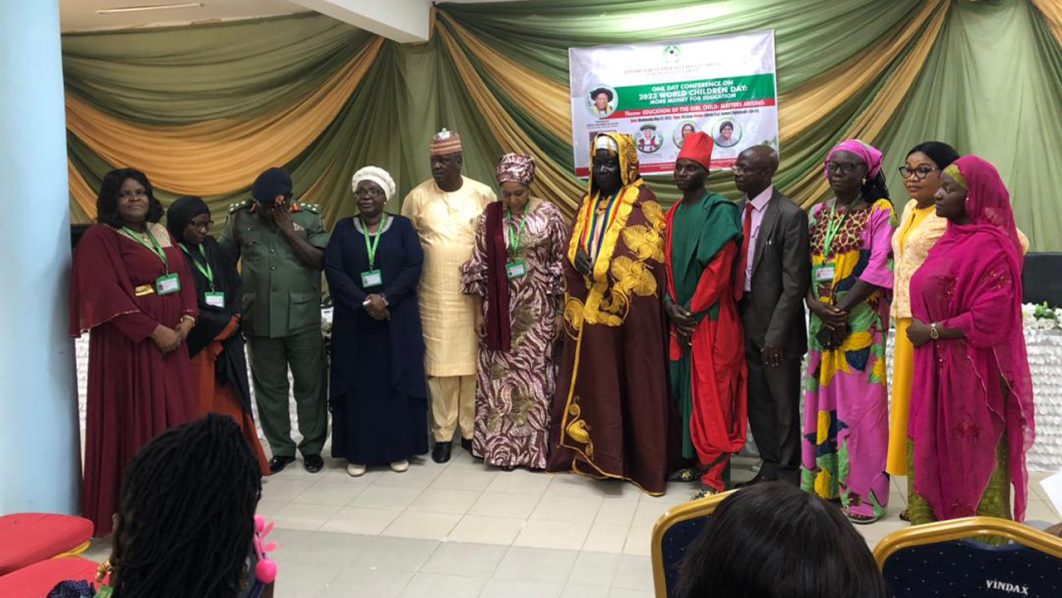
The conference has as a theme, Education for the Girl-Child: Matters Arising had erudite academicians examine problems limiting the girl-child and workable solutions to curb the challenges.
The conference was declared opened by the Director Genera, Nigerian Army Resource Centre, Abuja, Gen G. A. Wahab (Rtd), who doubled as the chairman of the occasion. In his opening speech, he revealed that there are lots of issues that informed the conference.
In his words: “A lot of issues informed the organization of the conference. The first is the fact that if we want to develop as a nation, we must look at the educational sector. We are in a global and digital world, everyone should be carried along, particularly the girls.
“Girls are suffering more than boys. From all the data available, girls are more than boys and we are not educating them. That means we are giving out a major percentage of our children and that has dire consequences. Political will, attitudinal change and budgetary allocation are parts of the issues, and to solve them, the government has to be heavily involved in education across board.”
The representative of UNESCO, Oyebukola Tomori-adeleye, who is the Project Officer, Education Sector, Abuja Region, in a goodwill message read on behalf of the head of the educational sector, lauded the conference organizers and reiterated UNESCO’s commitment to girl-child education in the country.
She said: “I am elated to be here, to garner new learnings on the challenges mitigating against access to quality education, and proffer possible solutions to address them. This gathering creates a platform to further foster the achievement of the education for change agenda and the Sustainable Development Goal (SDG)4 and its targets.
“This SDG is at the heartbeat of UNESCOs response globally, at ensuring inclusive and equitable quality education and promoting lifelong learning opportunities for all.”
The Keynote Speakers include Dr. Hauwa Kontagora, Prof. Uche S. Anaduaka, Prof. Ebele Anyaoku and other intellectuals, who spoke extensively on the myriad of problems faced by the girl-child and also proffered solutions to curtailing the excesses.
They called on both the government and society to collaborate in creating an enabling environment where gender equality in education can be achieved. Prof Anaduaka x-rayed challenges, particularly the socio-cultural factors, Prof Anyaoku, identified the role of digital libraries in education and Dr. Kontagora contended that the right to education should be justiciable such that citizens should be able to sue governments who fall short.
Brigadier General MO Ajala was another speaker, who spoke on the girl-child education in the theatre of war. He disclosed some of the contributions of the Nigerian Military to girl-child education.
“The Nigerian army involvement in the girl-child education includes rescue and relocation of the girl-child to IDP camps, and researching to improve their condition in the theatre of war.”
Consequently, the host and Director, Center for Gender Security Studies and Youth Advancement, Dr. Gloria Ibikunle, spoke about the conference.
She said: “The theme of this year’s Children’s Day was More Money for Education. At the Centre, we were of the view over a month ago that the issues of education in Nigeria, especially for the girl-child goes beyond money. We need to strategize and face segments of our children who have issues – vulnerable children, out-of-school children, children in abusive homes, children in IDPs; their access to education and we look at the second part, matters arising like the function of religion in education, health, sociocultural factors. When you marry off a girl at 12 or 14 years, it is difficult for that child to conclude her education. Like all the speakers have said, girl-child inclusion in education should be given utmost priority.”






